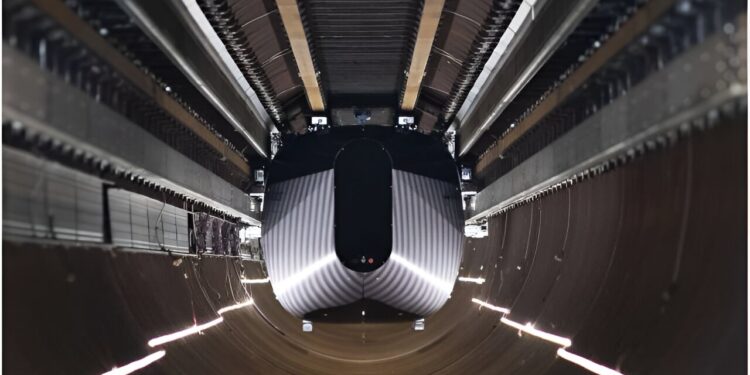A test vehicle levitated by magnetic fields travels through a depressurized tube in a testing ground for a high-speed transportation system during a press tour of a European test center for hyperloop transportation technology in Veendam, northern Netherlands, Friday, Sept. 6, 2024. Credit: AP Photo/Peter Dejong
It was a good week for space science, as two researchers from the Universidad Complutense de Madrid Ciudad Universitaria who specialize in asteroid dynamics discovered that a small asteroid will orbit Earth starting this month before heading off to other parts of the solar system. Meanwhile, a Kansas State University engineer published the results of an observational study he conducted to support a century-old theory that directly challenges the validity of the Big Bang theory. His arguments were backed up by images from three telescopes that included more than 30,000 galaxies and their redshifts relative to their distance from Earth. And an astrophysicist at the University of Western Ontario has found that the chances of asteroid 99942 Apophis hitting Earth are slightly higher than expected because of the possibility that the asteroid’s trajectory could be altered by a collision with another object.
On the technology front, a team of bioengineers at the Indian Institute of Science has developed a neuromorphic platform that enables a significant leap in computing efficiency. And Hyperloop project leaders in the Netherlands announced that a test vehicle was levitated and propelled through a tube at a test facility for the high-speed transportation system, demonstrating a breakthrough in the project. Elsewhere, engineers at the University of Washington demonstrated a stretchable wearable device that powers an LED using only the heat of a person’s skin. And a team of software and information systems engineers at Ben-Gurion University of the Negev in Israel extracted useful data from an isolated computer.
Meanwhile, a team of medical and psychiatric researchers at Yale School of Medicine has discovered new links between genes and how personalities are formed. Similarly, a team of geoscientists from Kyushu University and the University of Tokyo conducted the most detailed study ever of seismic activity, linking the strength of faults to the likelihood of large earthquakes. Finally, a team of sociologists from Rutgers University found from a survey that parents who actively teach their children how to handle or shoot guns are more likely to store loaded weapons in unsecured locations.
© 2024 Science X Network
Quote: Best of last week: Earth gets temporary moon, Hyperloop tests vehicle, why some parents don’t store their guns properly (2024, September 16) retrieved September 16, 2024 from
This document is subject to copyright. Apart from any fair dealing for the purpose of private study or research, no part may be reproduced without written permission. The content is provided for informational purposes only.



